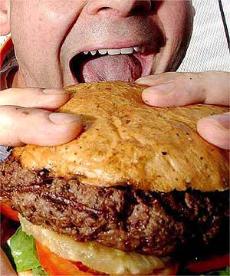 stuff.co.nz
stuff.co.nzBOSTON – Frequent and unrestrained binge eating is the country’s most common eating disorder, far outpacing the better-known weight control diseases anorexia and bulimia, according to a national survey conducted by researchers at Harvard University Medical School.
Psychiatric researchers at Harvard and the university-affiliated McLean Psychiatric Hospital in Belmont, Mass., have billed the study as the first national census of eating disorders. The results were published Thursday in the medical journal Biological Psychiatry.
The survey found that 3.5 percent of women and 2 percent of men suffer from binge eating, which the study defined as bouts of uncontrolled eating, well past the point of being full, that occur at least twice a week.
The doctors diagnosed fewer than 1 percent of women and .3 percent of men with anorexia, a disorder where an exaggerated fear of weight gain causes under-eating and malnourishment. The study determined that 1.5 percent of women and .5 percent of men had bulimia, an eating disease characterized by the “binge-purge” syndrome of overeating followed by vomiting.
Dr. Harrison Pope, an author of the study and the director of McLean’s Biological Psychiatry Laboratory, said binge eaters face severe risk of obesity and related diseases like diabetes, heart disease, stroke and certain cancers.
A binge eater, for instance, might eat a full dinner, then eat a quart of ice cream for dessert, followed by a bag of chips, without being able to stop, Pope said.
“It’s a little bit analogous to something you hear from an alcoholic, when they might say, ‘Well, I wanted to have one drink,’ and they’ve had 12 drinks and they’re passed out on the floor,” he said in a conference call with reporters. “Even though they feel full, even though they feel disgusting and guilty, they can’t stop.”
The researchers hope the results will convince editors of the American Psychiatric Association’s “Diagnostic and Statistical Manual of Mental Disorders,” the chief directory of psychiatric diagnoses, to include binge eating in the next edition.
Binge eating is classified as a “provisional disorder” in the most recent manual, last published in 1994, because few scholars had studied its symptoms and effects, said Dr. James I. Hudson, the survey’s lead author and a professor of psychiatry at Harvard Medical School.
“These results argue that binge eating is common. It’s more common than both the other eating disorders combined and it’s strongly associated with obesity,” he said. “Taken together these findings suggest that this is an eating disorder and should be treated as such.”
Hudson said the research team interviewed more than 9,000 people nationwide from 2001 to 2003, quizzing participants on their eating habits and psychological backgrounds. The study probably underestimates the actual population suffering from eating disorders because respondents are often ashamed to acknowledge their abnormal eating habits, he said.
The survey also found people struggle longer with binge eating – symptoms persist for an average of 8.1 years compared to 1.7 years for anorexic patients, who are often young and may recover as they mature. Bulimics suffer without cure for an average of 8.3 years, according to the study.
Men and women between the ages of 18 and 29 were most likely to be diagnosed with an eating disorder, while study respondents older than 60 had the lowest incidences of eating problems. The doctors said all three illnesses usually coincided with mood disorders like depression and anxiety.
A combination of the “cultural barrage” of images of rail-thin movie stars, ubiquitous fast-food advertising and genetic predisposition is usually the root of eating disorders, the study said.
Dr. B. Timothy Walsh, director of the eating disorders research unit at the New York State Psychiatric Hospital at Columbia University Medical Center, said the study confirms a widespread belief that the population of binge eaters is growing. He said if binge eating is a cause of obesity, psychiatrists could give more effective treatment to many overweight people.
“Everyone has a sense, whether from a casual inspection of people on Broadway or an empirical study, that there are a lot of problems with binge eating and overeating,” he said. “The question is, is it a cause or a symptom?”






